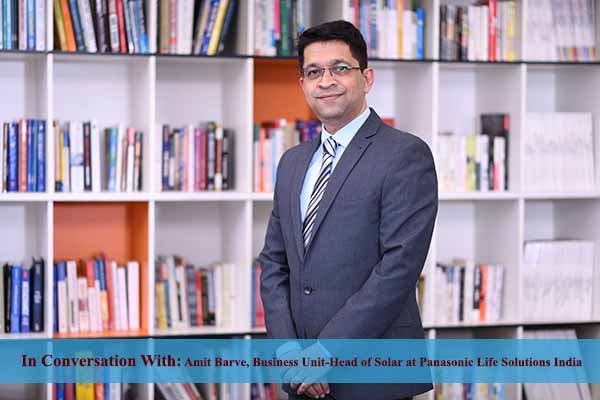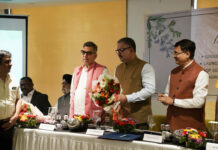Established in 1963, Panasonic Life Solutions India (formerly known as Anchor Electricals), is a wholly-owned subsidiary of Panasonic Corporation. With a constantly expanding product range and growing market share, it is one of the leading manufacturers of electrical construction materials with presence across India. TimesTech interacted with Amit Barve, Business Unit-Head of Solar at Panasonic Life Solutions India to learn about Indian Solar Market, Solar Modules, Opportunities and much more.
Read the full interview here:
TimesTech: How do you look at the Solar market in India? What are the available opportunities?
Amit: The demand for solar has been growing consistently in India as well as across the globe with CAGR of 20% for last few years and expected to continue at similar rates for coming years. In India total installed base of solar has reached 59 GW dominated by Utility sector contributing more than 50 GW and distributed sector contributing around 7-8 GW. GoI has taken voluntary target of installing 500 GW of renewables by 2030, and solar alone would be contributing 280 GW of that. This reflects our country’s high aspiration in this sector, and enormous potential that solar sector offers to all stake holders.
Utility sector is growing with lot of tendering activities happening in mega scale solar projects, hybrids with wind and storage as well as recently action has been even seen in floating solar projects. While in distributed sector, Commercial & Industrial (C&I) dominates installations, followed by installations on government buildings and most promising and upcoming market is that of residential rooftops.
TimesTech: What are the advantages of production in India and how you are planning to expand globally through domestic products?
Amit: Production across the value-chain of solar modules within India would help us to be more self-sufficient & give us a leverage on cost effective production on account of savings on freight charges, high USD exchange rates and faster turn-around time as compared to using imported components.
We already have seen lot of investments happening in India on raw material manufacturing and this is expected to keep growing further as well as deeper in value chain on account of launch of PLI scheme for solar manufacturing by GoI. Our journey has started but we still have long way to go in building scale of volumes, high level of Research & Development aided by robust local testing facilities.
We have already started exploring various countries for solar modules and with the help of respective local Panasonic offices we have started making inroads in these markets with supply of high-quality products. With current geo-political situation many of our customers are preferring solar modules especially “Made in India” and we are happy to cater to them. Our reach for exports has now reached to 8 countries in short span of one year.
TimesTech: Some of the components that are used in Solar modules and Solar Power Management Devices are not produced in India. How are you managing imports and exports?
Amit: As stated, India’s dependency on imported raw materials remains high. This is most common scenario now for most of domestic manufacturers., However, at Panasonic we ensure to deploy detailed planning & forecasting methodologies to cater to product wise requirements by looping in suppliers and working closely with our OEMs. This strategic procurement of raw materials helps us in ensuring highest of quality standards as well on time availability. Our consistent and high-quality supply to our channels regularly is one of the hallmarks for our long term partnerships with our channels.
For exports, over and above supply of products ‘made in India’ we are developing global flexible network of OEMs to cater to various markets locally thereby reducing dependence in centralised supply to markets.
TimesTech: Tell us about the key features of Panasonic’s residential kits and inverters that separates it from its competitors?
Amit: Panasonic’s group philosophy believes in manufacturing and supplying environmentally friendly, safe, high quality, reliable and long-lasting products. Every product before hitting market passes through all these critical parameters and we go beyond standard testing for certifications like IEC or BIS. We pass our products through rigorous testing to comply with our safety standards called as Panasonic Corporation Safety Standards (PCSS). Over and above routine type tests we do Glow wire test and smoke emission test to ensure safety of the product that goes to our consumers homes.
Our soon-to-be-launched residential kits will be offering end-to-end product and service backed solution by the trust and expertise of our brand for home set-ups. We will be the one-point responsibility wherein most components will be from Panasonic. An accessible offering given our better reach in terms of customers backed by our existing & vast service network Pan India. Given the urgent need for penetration of this category in the residential segment, our endeavour will be to hand-hold our partners & customers to make the transition to solar smooth and cater to queries promptly.
Our solar inverters are compact, sturdy, low maintenance with plug and play features. Intelligent Maximum Power Point Tracking algorithm enables in maximizing the yield from solar modules. Equipped with touch sensitive OLED screen and real time monitoring; with remote locations using Wi-Fi or GPRS. These range from 3 kW to 25 kW capacity providing high system performance. It also comes with 10 years of warranty. All our offerings come with reliable after sale service assurance through the top-class network across country.
TimesTech: How is Indian government policy helping in the expansion and growth of the solar industry in India?
Amit: The demand for solar has been witnessing a meteoric growth in India & worldwide given the push for urgent action plan required to avert climate crisis. As a part of voluntary action plan various countries are taking targets in COP summits, corporations are taking RE 100 goals, amid climate crisis as well as coal shortages. Government of India too has been taking host of initiatives to boost installation of renewable energy which includes, but not limited to the following:
Government has been enabling demand creation with policies esp. with targets set in for COP26 through various tenders for utility scale installations. The Production Linked Incentive (PSI) scheme has been booster for manufacturers in India. All government buildings are being planned to be converted to solar. 20% of all illumination happening in the national highways need to be from solar energy source. Further, multiple tenders and initiatives from public sector units (PSUs) for installing large-scale solar power deployment is seen. Policies such as net metering, virtual net metering, and KUSUM schemes for solar pumping systems have altered the landscape of distributed solar installation, to a large extent. Various state govt. initiatives like Gujarat announcing GW scale tenders for Solar residential rooftops has been adding to the growth. Also, to enable residential solar adoption, accessibility is crucial, therefore, a digital National portal has been introduced for Solar rooftop adoption helping smoothen approval processes & easy disbursal of central subsidy.
Corporates & businesses have been voluntarily taking up aggressive targets for Net zero goals and have been adopting solar in various forms; right from installations on their rooftops/ premise ground space & utilizing open access to buy green energy while also buying green certificates.
TimesTech: What are PLSI’s plans and focus areas moving forward?
Amit: In alignment with the global Panasonic philosophy towards carbon neutrality, we have set ourselves an ambitious goal to achieve the same by year 2030. Already, all our factories have installed solar rooftop power generating system which cater to a part of their energy requirement.
Currently we provide a gamut of products and services as it is aligned with our business philosophy of innovation & customer-centricity. We at Panasonic are very bullish on Solar business in India as well as in exports too as we have been growing more than double every year for last three years and plan to expand to more countries that have aggressive demand for solar.
In India, we expect to enhance our PAN India distribution network, introduce new product launches basis market needs such as solar residential kits and hybrid version of All-in-one streetlights. Our focus on C&I EPC projects will continue to be on 500 KWp+ solar energy projects and we will ensure to include versatile sectors and businesses to help industries make the green transition.














